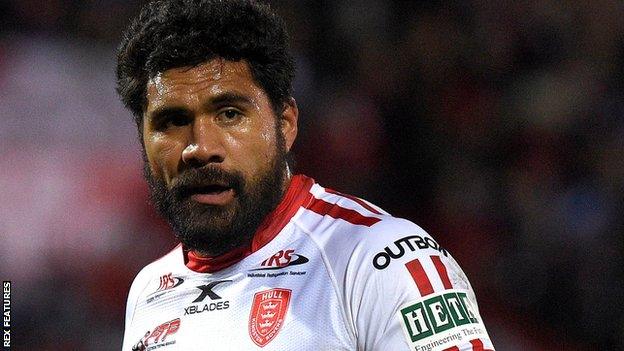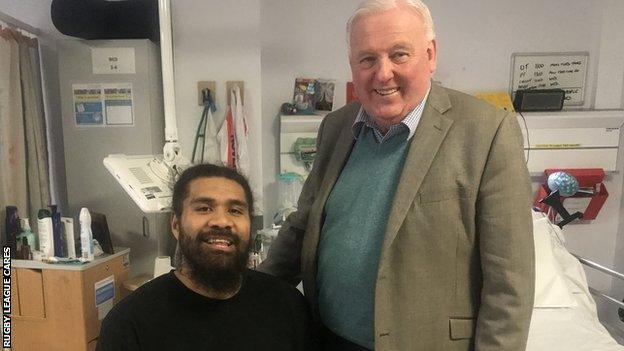How the Rugby League Benevolent Fund is helping those most in need
- Published

Hull KR's Mose Masoe suffered a career-ending injury in January
Rugby league can be the most beautiful sport, but it can also be one of the most brutal.
Bullet passes, skilful footwork and raw pace and power make for a thrilling spectacle, but as a contact game with physicality at its core, things can go wrong.
When catastrophe and tragedy do strike, thankfully there are organisations such as the Rugby League Benevolent Fund, and in particular general manager Stephen Ball, to help those affected move forward.
"It makes me feel very special to be part of the organisation," Ball told BBC Radio 5 Live's Rugby League podcast.
The fund was established in 2004, after separate incidents involving Mold Green player Danny Scott and Matt King of the London Broncos left both players with serious spinal injuries.
Previously, short-term fundraising such as bucket collections had been staged to raise money, but with many needing lifelong care it was felt more needed to be done.
"It completely changes their lives, theirs and their families lives," Ball continued.
"The rugby league as a family responded to help them, as they always do, but it wasn't co-ordinated or joined up, and it was felt the game owed some response to these people."
Ball says there are 20 "full-time" cases on the register, the majority being players who require lifelong support for injuries suffered while playing.
'There was fear in Mose's eyes'
One player to have found support from the fund is Hull Kingston Rovers prop Mose Masoe, who recently suffered a serious spinal injury during a pre-season fixture.
Ball was referred to the case by the Rugby Football League within hours of the injury occurring, and the RLBF has already made an impact for 30-year-old Samoa international Masoe and his family.
"I went to see him the next day in hospital, he was in Leeds General Infirmary at that time, his wife was stricken by everything that had happened," Ball added.
"There was genuine fear in Mose's eyes, his body had collapsed as such and we didn't know the extent of his injuries.
"It's a bizarre thing to say to say to anybody, but within 30 seconds of meeting him, I held hands with a 6ft 7in giant of man and told him we would be best friends in the future. That has been the case."

Stephen Ball (right) visited Mose Masoe in hospital
Since being admitted to Pinderfields Hospital, Masoe's condition has improved to the extent he has been able to walk with the aid of crutches and a frame.
The RLBF has also helped, with the support of the medical staff, to ensure his departure from hospital to home runs smoothly - which is hoped to be by the end of April.
"We feared the worst when we first saw him," Ball continued. "Pinderfield's staff told us sportspeople and military are the best to deal with because they are disciplined enough to do what's asked of them.
"Everything at home will be sorted out, the benevolent fund have put a stairlift into his rented accommodation, the occupational therapists from Pinderfield have put ramps in and handles in showers etc.
"There will be a degree of comfort at the end of April that wouldn't have been there."
'I'm there to take away some of the sharp corners'
Another high-profile story in which Ball and his team have been able to make a difference, came with the tragic death of Keighley half-back Danny Jones from an undiscovered heart problem in a game at London Skolars during the 2015 season.
Jones' death left his wife Lizzie Jones and their twins Bobby and Phoebe - just five months old at the time - in a heartbroken state. Ball's visit to the family was just the start of the journey to overcome the loss.
"I knew Danny Jones to nod to, and when he died at London Skolars I went to see his wife in Halifax," Ball said.
"I knocked on the door and there was Liz's dad, an enormous man who was a boxing coach. He looked at me suspiciously, but waved me through.
"I explained what the Benevolent Fund was about, saying we were here to help. After about 40 minutes, her dad who had been stood at the door asked me if I wanted a bottle of beer. I didn't want one, he didn't want one - but it was an acknowledgement that he was welcoming me into the family to help his daughter.
"Most people recognise that when I got into a family set-up, I'm there to help and take away some of the sharpest corners."
Compassion and understanding are key attributes in Ball's job, when it comes to meeting with those who are crestfallen, perhaps experiencing life-changing injury or grieving for those who died playing the sport they love.
Ball, a former amateur player and previously director at professional clubs such as Leeds, Batley and Hull FC, sees himself as "a rugby league person" first and foremost, and that link with those who he comes across is an important bridge.
He rejects the idea of being a social worker, more a sympathetic ear and a helping hand.
"We're all human, I see the pain in people's face and what they're experiencing," he added.
"I try to be a good listener in such circumstances, I'm not there to tell people what to do or how to behave.
"I suggest things and explain things that have worked for some people, but I wouldn't be doing my job right if I didn't feel the emotion of the job. It provides a certain empathy."